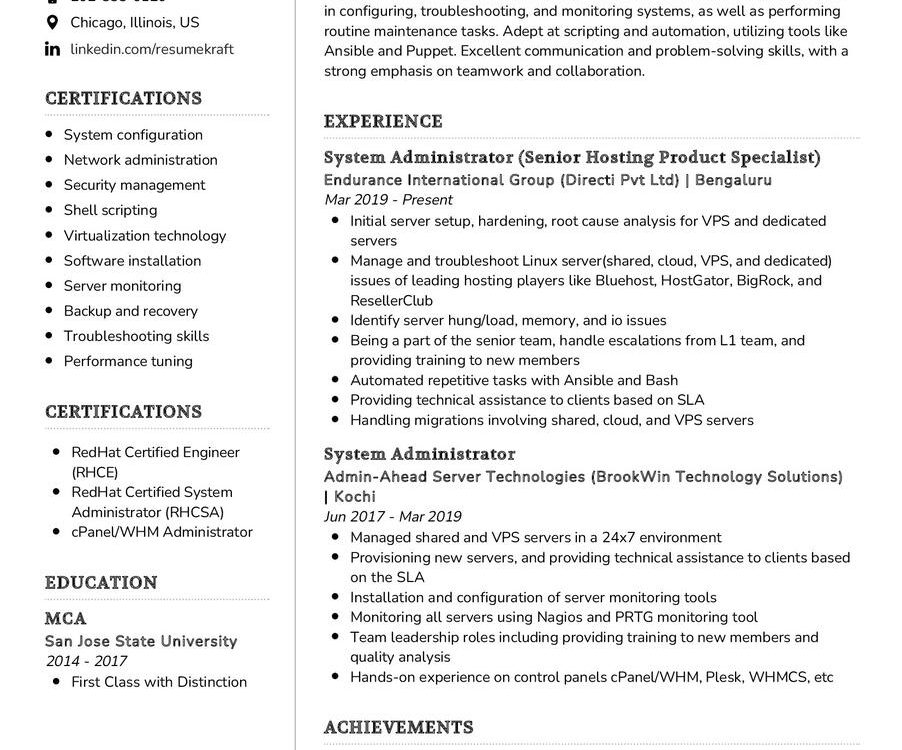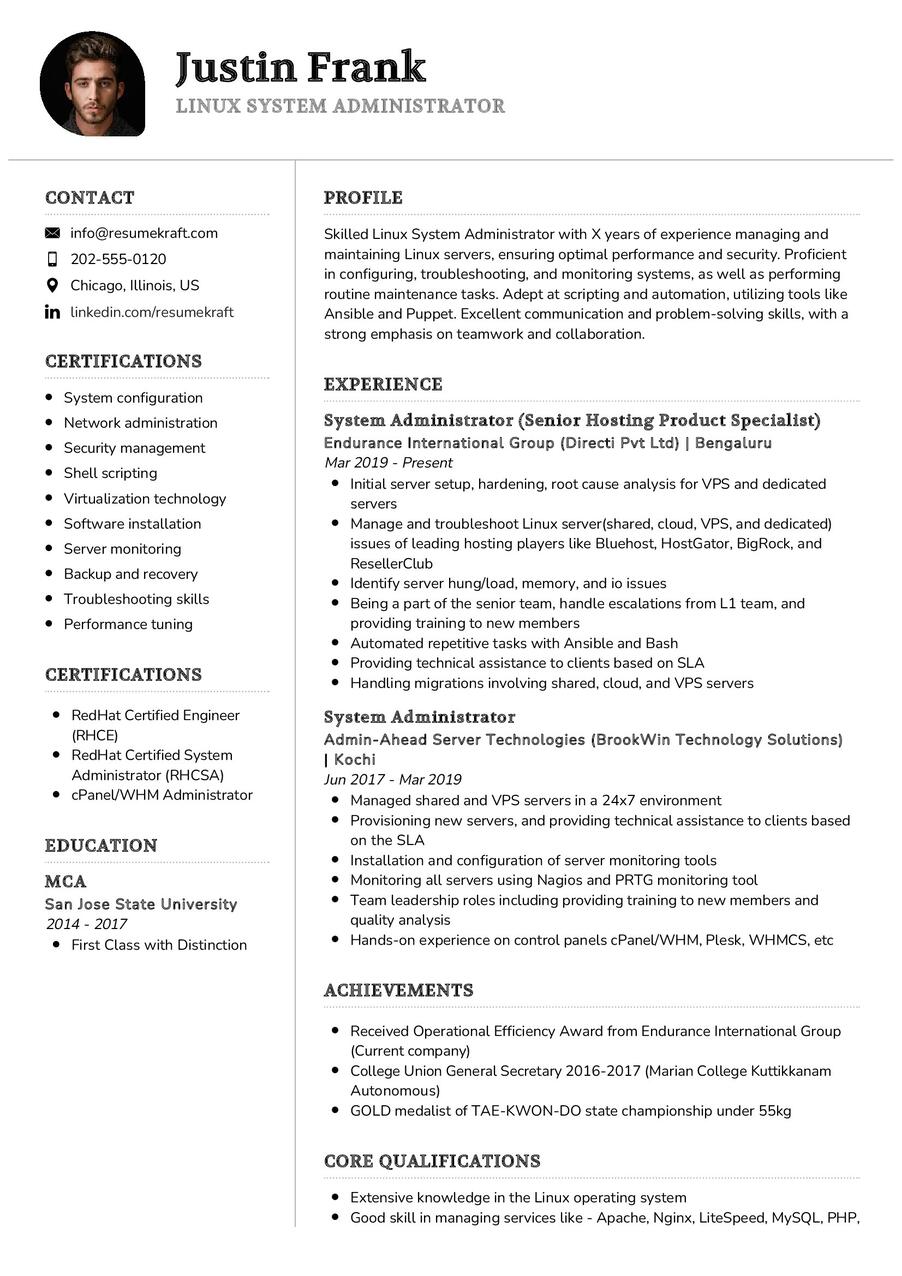Exploring the Role of a Linux System Administrator
In the ever-evolving landscape of IT, the position of a Linux System Administrator plays a pivotal role in ensuring the seamless functioning of an organization’s IT infrastructure. This role requires a unique blend of technical prowess and problem-solving skills, making it a cornerstone in the realm of information technology. Let’s delve into the multifaceted role of a Linux System Administrator, a position that demands a deep understanding of Linux systems coupled with the ability to troubleshoot and optimize system performance.
A Linux System Administrator is tasked with the responsibility of managing and maintaining Linux servers, ensuring their reliability, security, and efficiency. Beyond the technical aspects, they often serve as the bridge between the IT team and other departments, translating complex technical issues into understandable insights for non-technical stakeholders. Let’s explore the key responsibilities and requirements that define the role of a Linux System Administrator.
Requirements for a Linux System Administrator Role
Embarking on the journey to become a Linux System Administrator requires fulfilling a set of stringent requirements. This path involves continuous learning and hands-on experience. Here are the prerequisites that one needs to meet to step into the role of a Linux System Administrator:
- A Bachelor’s or Master’s degree in Computer Science, Information Technology, or a related field, showcasing a solid foundation in the technical domain.
- Proficiency in Linux operating systems, including in-depth knowledge of server configurations, security protocols, and system optimization.
- Hands-on experience in Linux server administration, demonstrating a trajectory of increasing responsibility and skill development.
- Strong problem-solving skills, honed through experiences and possibly through relevant courses and certifications.
- Scripting skills, with expertise in languages such as Bash or Python, essential for automating tasks and optimizing system processes.
- Ability to work efficiently under pressure, developed through years of experience in dynamic IT environments.
Acquiring additional certifications in Linux system administration can enhance your profile in the competitive job market.
Responsibilities of a Linux System Administrator
The role of a Linux System Administrator encompasses a wide range of responsibilities, blending technical expertise with strategic thinking. Let’s unravel the core responsibilities that define this role:
- Managing and maintaining Linux servers, ensuring optimal performance, security, and availability.
- Implementing system upgrades and patches, staying abreast of the latest developments in Linux technologies.
- Troubleshooting system issues, resolving technical problems promptly to minimize downtime.
- Collaborating with cross-functional teams to integrate Linux systems with other business applications.
- Conducting training sessions for end-users, promoting a culture of knowledge sharing and continuous learning within the organization.
- Ensuring compliance with organizational policies and industry standards, safeguarding data integrity and system security.
- Keeping up-to-date with emerging trends in Linux and IT, guiding the team towards adopting best practices and innovative solutions.
Each responsibility brings unique challenges and opportunities for learning, contributing to your growth as a Linux System Administrator.
Linux System Administrator CV Writing Tips
Crafting a compelling CV is crucial in showcasing your skills and experiences as a Linux System Administrator. Here are some tips to help you create a standout CV:
- Highlight your hands-on experience with specific Linux distributions, detailing your achievements and optimizations made.
- Showcase any automation projects or scripting tasks you’ve undertaken, emphasizing their impact on system efficiency.
- Quantify your achievements with metrics, providing a tangible measure of your contributions to system performance and security.
- List relevant certifications, underscoring your commitment to continuous learning in the dynamic field of Linux system administration.
- Customize your CV for each application, tailoring your narrative to align with the specific requirements of the role.
Each tip is a brushstroke, helping you paint a portrait that reflects your expertise and accomplishments as a Linux System Administrator.
Linux System Administrator CV Summary Examples
Your CV summary serves as the opening act of your career story, setting the stage for what follows. Here are some examples to inspire you:
- “Linux System Administrator with over 8 years of hands-on experience, adept at optimizing server performance and ensuring the security of mission-critical systems.”
- “Results-driven Linux System Administrator with a proven track record in implementing system upgrades, reducing downtime, and enhancing overall system efficiency.”
- “Experienced Linux System Administrator specializing in troubleshooting and resolving complex technical issues, committed to staying ahead in the dynamic field of IT.”
Each summary provides a glimpse into your career journey, strengths, and vision as a Linux System Administrator.
Building a Strong Experience Section for Your Linux System Administrator CV
Your experience section is the heart of your CV, showcasing the rich experiences and milestones achieved throughout your career. Here are some examples to guide you:
- “Led a team of Linux administrators in a high-paced IT environment, achieving a 15% improvement in system response time through strategic optimizations.”
- “Implemented a comprehensive security protocol, resulting in a 30% reduction in system vulnerabilities and ensuring data integrity.”
- “Executed server migration projects, seamlessly transitioning from legacy systems to modern Linux distributions, improving overall system performance.”
Each experience is a chapter in your career story, narrating tales of challenges met, solutions found, and successes achieved.
Educational Background for Your Linux System Administrator CV
Your educational journey serves as the foundation of your career. Here’s how you can list your educational milestones:
- Master of Science in Computer Science, XYZ University, a journey of in-depth learning and specialization, 2015.
- Bachelor of Technology in Information Technology, ABC University, the stepping stone to your career in Linux system administration, 2012.
- Linux Professional Institute Certification (LPIC-1), a testament to your expertise in Linux systems, 2016.
Each educational qualification is a building block, contributing to your success as a Linux System Administrator.
Linux System Administrator Skills for Your CV
Your skill set is your toolbox, equipped with a diverse range of tools honed over the years. Let’s list down the essential skills that a Linux System Administrator should possess:
Soft Skills:
- Problem-solving abilities, the knack of finding solutions in challenging situations.
- Effective communication and interpersonal skills, facilitating collaboration with cross-functional teams and non-technical stakeholders.
- Attention to detail, a meticulous approach to ensuring system security and reliability.
- Adaptability and resilience, the strength to navigate through evolving IT landscapes.
Hard Skills:
- Proficiency in Linux server administration, including in-depth knowledge of server configurations, security protocols, and optimization techniques.
- Scripting skills, with expertise in Bash or Python, essential for automating tasks and optimizing system processes.
- Knowledge of containerization technologies, such as Docker or Kubernetes, for efficient deployment and scaling of applications.
- Experience with configuration management tools like Ansible or Puppet, streamlining system administration tasks.
- Understanding of networking concepts, ensuring seamless communication between servers and systems.
Each skill is a tool, aiding you in optimizing Linux systems and leading your team effectively.
Common Mistakes to Avoid When Writing a Linux System Administrator CV
Avoiding common pitfalls is essential when crafting your CV. Here are mistakes to steer clear of:
- Using generic language, a strategy that fails to highlight your unique fit for the Linux System Administrator role.
- Focusing solely on job duties without showcasing your achievements, resulting in a narrative lacking depth and impact.
- Underestimating the importance of a cover letter, missing an opportunity to connect with potential employers on a personal level.
- Overloading your CV with technical jargon, risking the clarity of your true value as a Linux System Administrator.
- Neglecting proofreading, a mistake that can leave a negative impression on potential employers.
Avoid these pitfalls to craft a CV that is both authentic and compelling.
Key Takeaways for Your Linux System Administrator CV
As we conclude this comprehensive guide, let’s recap the key points to keep in mind while crafting your Linux System Administrator CV:
- Highlight your hands-on experience and specific achievements in Linux server administration.
- Showcase your scripting skills and automation projects, emphasizing their impact on system efficiency.
- Quantify your achievements with metrics, providing tangible evidence of your contributions to system performance and security.
- List relevant certifications, underlining your commitment to continuous learning in the dynamic field of Linux system administration.
Finally, feel free to utilize resources like AI CV Builder, CV Design, CV Samples, CV Examples, CV Skills, CV Help, CV Synonyms, and Job Responsibilities to create a standout application and prepare for the Linux System Administrator job interview.


